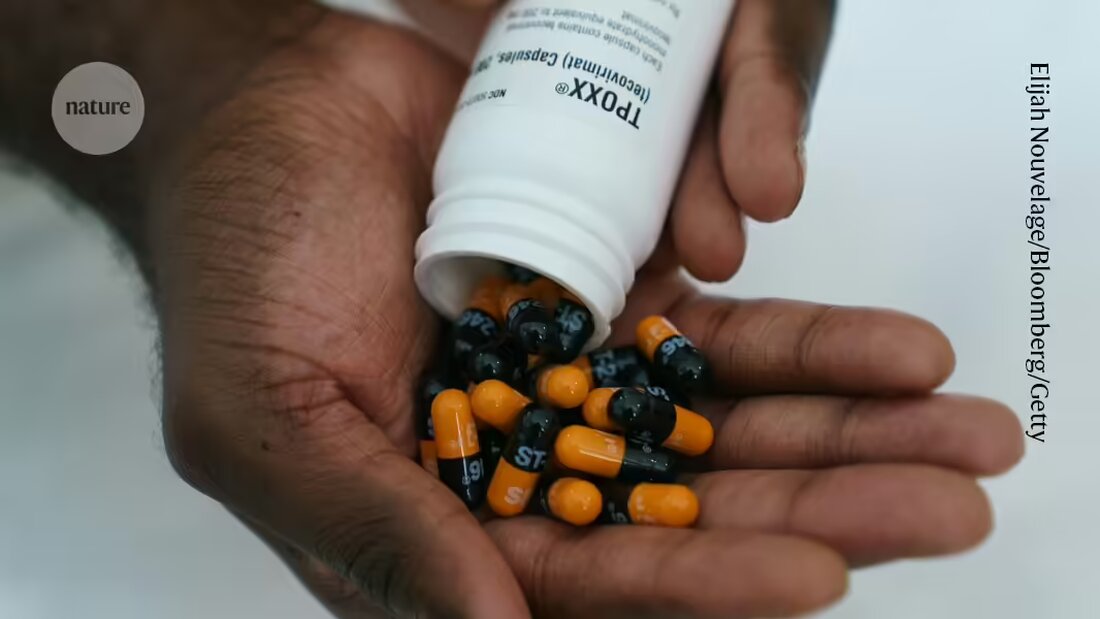The Active ingredient Tecovirimat did not speed recovery in people infected with a worrisome variant of the monkeypox virus in a clinical trial in the Democratic Republic of Congo (DRC), the US National Institutes of Health (NIH) reported. The variant, called Clade I, has spread across Africa and is considered deadlier than the one that caused a global Mpox outbreak, which began in 2022, known as Clade II.
Tecovirimat, an antiviral, is often used to treat Mpox, although there is limited clinical evidence that it relieves symptoms. The drug was originally developed to treat smallpox, which is caused by a related orthopox virus.
“These results are certainly not what we were all hoping for,” says Jason Kindrachuck, a virologist at the University of Manitoba in Winnipeg, Canada.
The spread of Clade I in the DRC and other African countries prompted the World Health Organization (WHO) on August 14 to declare the outbreak an international public health emergency of major concern – their highest alert level. A day earlier, the Africa Centers for Disease Control and Prevention (Africa CDC) declared the outbreak a public health emergency for the first time.
And yesterday, Sweden reported the first case of a person infected with a variant of Clade I called Clade Ib, the scientists reported in April
Disappointing results
During the study, conducted by the NIH's National Institute of Allergy and Infectious Diseases (NIAID) and the DRK's National Institute of Biomedical Research, infected people with clade I received either tecovirimat or a placebo pill. According to the NIH, which released preliminary results on August 15, the antiviral did not reduce the duration of Mpox symptoms compared to placebo.
Mpox, caused by the monkeypox virus, can cause fluid-filled lesions, fever, headache, and in severe cases it can also cause death.
What was significant, however, was that the mortality rate of the study participants, regardless of whether they received Tecovirimat or a placebo, was lower than the overall mortality rate typically reported for each Mpox type in the DRK: 1.7% versus 3.6%.
This could be due to the care participants received during the study. The 597 people who took part in the study were hospitalized for at least 14 days, during which they received, among other things, nutritional support, adequate hydration, treatment for other infections or illnesses, including malaria, and psychosocial support.
“The supply was very high,” says Lori Dodd, a biostatistician at NIAID in Bethesda, Maryland, and project leader of the study. Maintaining this high standard of care outside of a clinical trial could be challenging, she adds. “The team will work on how to translate this model of care to people with Mpox recovering on an outpatient basis and in resource-limited settings.”
Hope for certain groups
The manufacturer of Tecovirimat, SIGA Technologies based in New York City, stated in a press release that study participants who were treated with the drug early and those with severe disease had a “significant improvement.” However, the full data has not yet been published. They will be analyzed and a manuscript will be prepared for submission to a peer-reviewed journal, Dodd said.
“We are all looking forward to the article, especially to see whether a group could be selectively chosen for treatment, particularly people with HIV,” says Piero Olliaro, an infectious disease specialist at the University of Oxford, UK. He points out that outcomes tend to be worse for people with advanced HIV infection and monkeypox virus infection 1.
It is not yet clear whether the study results can be transferred to Clade Ib. “We know little about clade Ib so far, and further study of the clinical presentation and outcomes is needed to determine whether new clinical trials are needed,” says Olliaro.
Although these preliminary results for Tecovirimat are disappointing, says Kindrachuck, they suggest that "if we can get resources to support patients with Clade I Mpox in the DRC and beyond, we can actually increase recovery."
Nicaise Ndembi, a virologist at the Addis Ababa-based Africa CDC, says the findings do not change the response plan to the current outbreaks, which includes improving surveillance, increasing laboratory testing, strategically distributing the limited available vaccine doses and negotiating the acquisition of additional doses. However, they emphasize that appropriate care is crucial to reduce mortality associated with Mpox.
Although a vaccine against Mpox exists, made by biotechnology firm Bavarian Nordic in Hellerup, Denmark, it is largely unavailable in African countries. Bavarian's CEO, Paul Chaplin, however, reported to STAT News that the European Union has placed an order for 175,000 doses to be donated to the Africa CDC.

 Suche
Suche
 Mein Konto
Mein Konto

